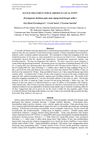Search
forLearn
2 / 2 resultslearn GHK-Cu
a copper peptide showing promise in both regrowth and reversing gray hair
Research
5 / 1000+ results
research Targeted Nutritional Supplementation for Telogen Effluvium: Multicenter Study on Efficacy of a Hydrolyzed Collagen, Vitamin, and Mineral-Based Induction and Maintenance Treatment
Special supplements with collagen, vitamins, and minerals can help treat hair loss.

research Epidemiology and Assessment of Hair Loss Among Adults in Sulaimani Governorate: A Sample Cohort Study
Timely treatments like PRP, topical, and drugs can effectively reduce hair loss.
research Common Skin Disorders in Pediatric Skin of Color
Children with darker skin tones can have specific skin conditions that need tailored treatments.

research Sulfur Treatment for Scabiosis in Local Puppy
Sulfur-based treatments combined with simparica effectively treat scabies in puppies.

research Precision Therapeutics in Non-Scarring Alopecia: A Systemic Genomic and Pathway-Based Framework for Targeted Interventions
Personalized treatments for hair loss focus on specific genetic and biological pathways.
Community Join
5 / 304 resultscommunity Hair Remedies that Don't Work for Anybody Seeking Hair Regrowth
Hair loss treatments discussed include minoxidil, finasteride, and RU58841. Salon products and supplements generally don't work for hair regrowth unless there's a severe nutritional deficiency, while hormonal treatments like estrogen and spironolactone can be effective.
community What all oils could be useful to augment hair growth
The user uses 1mg fin every other day, a topical solution of 5% min + 0.1% fin nightly, and seeks advice on oils for hair growth. Replies suggest oils are ineffective and recommend sticking with fin and min treatments.
community Hormonal panel after 1 year of treatment - DHT levels doubled!!
A 27-year-old man shared his hormonal panel results after one year of taking finasteride 1mg/day for hair loss, showing his DHT levels nearly doubled. He reported stabilized hair loss with mild side effects that resolved, and he is considering a hair transplant but is concerned about the increased DHT levels and potential treatment options.
community Female, 27 years old, shedding/ balding despite being on what is considered to be a effective treatment plan for AGA. Considering Dut (oral) . Please help.
A 27-year-old woman with androgenic alopecia is losing hair despite using oral minoxidil and spironolactone, and is considering dutasteride. She is exploring causes like stress and medication side effects, planning tests, and considering treatment changes.
community Been on Min and Fin for Years and I am Devastated.
Guyman567 has been using oral finasteride and topical minoxidil for years but continues to experience hair loss and thinning, which has affected his confidence. He has tried various treatments including topical finasteride, microneedling, and vitamins, and is considering a hair transplant but is concerned about ongoing hair loss.